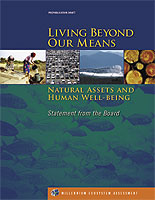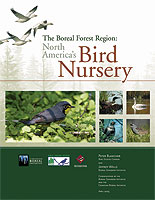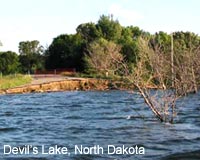
News |
- Mackenzie WILD Site Launched
- Canada Ranked - Indigenous Peoples Report
- Assessment Warns Ecosystem Changes Continue
- Ontario Migratory Bird Violations - Factual Records
- Forest Database Highlights Manitoba Concerns
- North Dakota to Pipe Water from Canada
- 50% of North American Birds Depend on Boreal
- Groups Tell Leaders Action Needed
- Ontario Wilderness Tourism at Risk
- Devils Lake Outlet Hangs in the Balance
- Haida Nation Blockade
- Climate Change Inevitable in 21st Century
| Mackenzie WILD Site Launched | 12 May 05 |
 The Sierra Club of Canada (SCC) launched its newest website on Earth Day, April 22, 2005. MackenzieWild.ca features information on the $7 billion Mackenzie Gas Project, and asks visitors to sign the Mackenzie WILD Declaration in order to constrain the unsustainable growth of the tar sands industry in Alberta, as well as protect Mackenzie Valley wilderness. The Sierra Club of Canada (SCC) launched its newest website on Earth Day, April 22, 2005. MackenzieWild.ca features information on the $7 billion Mackenzie Gas Project, and asks visitors to sign the Mackenzie WILD Declaration in order to constrain the unsustainable growth of the tar sands industry in Alberta, as well as protect Mackenzie Valley wilderness."The $7 billion Mackenzie Gas Project is key to the planned five-fold expansion of oil production from Alberta tar sands by 2030. The 1.5 billion cubic feet per day of Mackenzie natural gas is crucial to fueling extraction of bitumen from the tar sands as well as providing hydrogen to upgrade the bitumen." said Stephen Hazell, who directs the Mackenzie WILD project for Sierra Club of Canada. The Mackenzie WILD Declaration is being endorsed by Canadians from across the country as well as northern and national organization including the: Arctic Indigenous Youth Alliance; Council of Canadians; Ecology North; and Sierra Youth Coalition. View the Sierra Club of Canada April 22, 2005 press release Visit the new Sierra Club of Canada 'Mackenzie WILD' website Source: Sierra Club of Canada |
|
| Canada Ranked - Indigenous Peoples Report | 10 May 05 |
 Canada's high ranking on the United Nations' human development scale would dramatically drop if the country were judged solely on the economic and social well-being of its First Nations people. Canada's high ranking on the United Nations' human development scale would dramatically drop if the country were judged solely on the economic and social well-being of its First Nations people.According to a new UN report by UN special investigator Rodolfo Stavenhagen, Canada would be placed 48th out of 174 countries if judged on those criteria, a significant drop from Canada's usual top 10 ranking on the UN's human development scale. Paul Meyer, Canada's ambassador to the UN in Geneva, agrees the health of native people in Canada is "a matter of serious concern." Stavenhagen researched the plight of Canada's indigenous peoples on a visit to the country from May 21 to June 4, 2004, at the invitation of the Canadian government. View the full April 11, 2005 CBC Online News story View the December 2004 Human rights and indigenous issues Report - Addendum Mission To Canada (PDF) Sources: CBC News, UN Office of the High Commissioner for Human Rights |
|
| Assessment Warns Ecosystem Changes Continue | 10 May 05 |
 The Millennium Ecosystem Assessment (MA) Synthesis Report, released March 30, 2005, and conducted by 1,300 experts from 95 countries, reveals that approximately 60 percent of the ecosystem services that support life on Earth - such as fresh water, capture fisheries, air and water regulation, and the regulation of regional climate, natural hazards and pests - are being degraded or used unsustainably. UN Undersecretary Hans van Ginkel says the assessment reveals a consensus among the world's social and natural scientists. "It's not yet extreme, it's not exactly immediate collapse, but we better act before the collapse is there," he said. The Millennium Ecosystem Assessment (MA) Synthesis Report, released March 30, 2005, and conducted by 1,300 experts from 95 countries, reveals that approximately 60 percent of the ecosystem services that support life on Earth - such as fresh water, capture fisheries, air and water regulation, and the regulation of regional climate, natural hazards and pests - are being degraded or used unsustainably. UN Undersecretary Hans van Ginkel says the assessment reveals a consensus among the world's social and natural scientists. "It's not yet extreme, it's not exactly immediate collapse, but we better act before the collapse is there," he said.The Millennium Ecosystem Assessment (MA) Synthesis Report is the first of seven reports and four technical volumes that assess the state of global ecosystems. This report is being released together with a statement by the MA board of directors entitled Living beyond Our Means: Natural Assets and Human Well-being. Modeling of future scenarios suggests human societies can ease the strains being put on nature, while continuing to use them to raise living standards. But it requires, says the MA, changes in consumption patterns, better education, new technologies and higher prices for exploiting ecosystems. Visit the Millennium Ecosystem Assessment web site View the Millennium Ecosystem Assessment press release of March 30, 2005 View the March 30, 2005 BBC news article regarding the Millennium Ecosystem Assessment View the March 31, 2005 CBC news article regarding the Millennium Ecosystem Assessment Sources: Millennium Ecosystem Assessment, CBC, BBC |
|
| Ontario Migratory Bird Violations - Factual Records | 10 May 05 |
 Conservation groups' struggle to hold the Government of Ontario accountable for its careless destruction of migratory birds in the course of forestry operations continues. Conservation groups' struggle to hold the Government of Ontario accountable for its careless destruction of migratory birds in the course of forestry operations continues.The Sierra Legal Defence Fund (SLDF) on behalf of several Canadian and US environmental groups filed a submission with the Secretariat of the North American Commission for Environmental Cooperation (CEC) under NAFTA on February 6, 2002. The submission concerns clearcut logging carried out in 49 forest management units (FMUs) in central and northern Ontario in 2001. A revised submission estimates that clear cutting activity in 2001 destroyed 44,000 migratory bird nests in central and northern Ontario forests. The submission also alleges that Environment Canada has taken virtually no action to enforce Section 6(a) of the MBR in regard to this logging activity. The CEC subsequently issued an order for a factual record and since then, a second factual record has been compiled. On April 4, 2005, the CEC ordered the consolidation of these factual records for consideration and comment by all parties involved. View the April 4, 2005 Commission for Environmental Cooperation press release View the March 24, 2004 Manitoba Wildlands news item on the CEC case Source: Commission for Environmental Cooperation |
|
| Forest Database Highlights Manitoba Concerns | 05 May 05 |
 As Canada marks National Forest Week, the Sierra Club of Canada unveiled the most comprehensive database of forestry practices in Canada, providing a revealing picture of forestry practices across Canada and in Manitoba. As Canada marks National Forest Week, the Sierra Club of Canada unveiled the most comprehensive database of forestry practices in Canada, providing a revealing picture of forestry practices across Canada and in Manitoba.The database evaluates the progress of Manitoba and other provinces in their commitments under the National Forest Strategy (NFS), a national road map for more ecologically and socially sustainable forest management. The NFS includes several commitments that are considered key by the Sierra Club of Canada, such as strengthening the role of Aboriginal People in forest management, maintaining carbon reservoirs, completing networks of protected areas and using ecosystem-based forest management. "As the database illustrates, Manitoba does have some progressive forest policies, but these policies are not being implemented into practices. The database illustrates concerns with the East Side Planning Initiative, which still has not delivered any planning. In particular, we are concerned about the slow pace of protected areas establishment in Manitoba's boreal forest regions," noted Gaile Whelan-Enns, the Director of Manitoba Wildlands. The database launch follows the release of Sierra Club Canada's Executive Director Elizabeth May's updated book, At the Cutting Edge. Visit the interactive national forest strategy audit database View the full Sierra Club May 5, 2005 release Visit the National Forest Strategy website View the Edmonton Journal May 5, 2005 article (PDF) View the Telegraph Journal May 5, 2005 article (PDF) Source: Sierra Club of Canada |
|
| North Dakota to Pipe Water from Canada | 05 May 05 |
 North Dakota is considering a plan to transfer water by pipeline from Lake of the Woods, located on the Canadian-U.S. border, in the event of a severe drought. A recent study concluded that if North Dakota continues to grow, a 1930s-type drought would leave the state with a water shortage equal to 90 per cent of its needs. The study found that such a drought is likely within 25 years. North Dakota is considering a plan to transfer water by pipeline from Lake of the Woods, located on the Canadian-U.S. border, in the event of a severe drought. A recent study concluded that if North Dakota continues to grow, a 1930s-type drought would leave the state with a water shortage equal to 90 per cent of its needs. The study found that such a drought is likely within 25 years.The North Dakota Bureau of Reclamation, charged with solving the state's critical water shortage, quietly added the Lake of the Woods pipeline to a list of supply options earlier this year. The pipeline would import 72 million cubic metres of water annually from the lake bordered by Manitoba, Ontario and Minnesota, almost as much as is taken by the city of Winnipeg from the same water system each year via Shoal Lake. Manitoba Minister of Water Stewardship, Steve Ashton said the province opposes the project. He said it is ironic that North Dakota wants to export infected water to Canada through Devil's Lake, while taking clean water from Lake of the Woods. Recently David Ramsay, Ontario's minister of natural resources said the Lake of the Woods proposal should be submitted to the International Joint Commission, for review under the Boundary Water Treaty between Canada and the United States. View the full April 12, 2005 Globe and Mail article (DOC) View the CBC May 5, 2005 article Source: Canadian Press |
|
| 50% of North American Birds Depend on Boreal | 03 May 05 |
 New scientific research released by the Canadian Boreal Initiative (CBI), May 2, 2005 shows that some of the North American birds scientists worry most about rely most on Canada's Boreal region for survival. New scientific research released by the Canadian Boreal Initiative (CBI), May 2, 2005 shows that some of the North American birds scientists worry most about rely most on Canada's Boreal region for survival."The Boreal is home to some of our most vulnerable and many more of our most abundant bird populations - that's part of its wealth of ecological values," said CBI Director Cathy Wilkinson. "Simply put, the future of our birds depends on the Boreal..." The new study was conducted by Dr. Peter Blancher of Bird Studies Canada for the Canadian Boreal Initiative and the U.S. based Boreal Songbird Initiative. It coincides with the beginning of spring rush hour in Canadian skies as migrating birds wind their way north from winter havens to breed in the Boreal. Key findings in the report include that 80% of the waterfowl species of North America, 63% of finch species, and 53% of warbler species breed, at least in part, in the Boreal. For nearly 100 species, 50% or more of their entire breeding populations occur in the region. View the CBI report: The Boreal Forest Region: North America's Bird Nursery View the full CBI May 2, 2005 press release View the Globe and Mail May 3, 2005 article (PDF) Source: CBI |
|
| Groups Tell Leaders Action Needed | 03 May 05 |
 The Sierra Club of Canada has joined with 35 environmental, labour and green industry associations to urge all parties put aside their differences long enough to ensure that measures necessary for implementation of the Kyoto Protocol, introduced in the February 2005 budget, are approved by Parliament without delay. Concerned that an election will be called before the recently announced federal measures can get underway, the groups have written a joint letter to Prime Minister Martin, Stephen Harper, Gilles Duceppe and Jack Layton. The Sierra Club of Canada has joined with 35 environmental, labour and green industry associations to urge all parties put aside their differences long enough to ensure that measures necessary for implementation of the Kyoto Protocol, introduced in the February 2005 budget, are approved by Parliament without delay. Concerned that an election will be called before the recently announced federal measures can get underway, the groups have written a joint letter to Prime Minister Martin, Stephen Harper, Gilles Duceppe and Jack Layton."We want to remind the leaders that protecting future generations from climate change is more important than playing politics in the present," said David Coon of the Conservation Council of New Brunswick who initiated the letter late last week. "There is no more time for politics on this issue. All parties must work together and for now that means passing the budget and getting action underway," said John Bennett, Senior Policy Advisor, Sierra Club of Canada. The groups hope all political parties will embrace climate action as a fundamental plank in their platforms and work together to develop a national consensus on measures to reduce greenhouse gas emissions. View the Letter to Party Leaders and Sierra Club of Canada April 27, 2005 release Source: Sierra Club of Canada |
|
| Ontario Wilderness Tourism at Risk | 03 May 05 |
 Ontario's status as a world-class wilderness tourism destination is under threat unless the government adopts new policies now, according to the CPAWS-Wildlands League and Ontario Nature, two non-profit conservation groups. Ontario's status as a world-class wilderness tourism destination is under threat unless the government adopts new policies now, according to the CPAWS-Wildlands League and Ontario Nature, two non-profit conservation groups.The findings in Remoteness Sells, a new report the groups launched in April 2005, indicate that remote recreational and tourism opportunities across Ontario could dwindle as industrial development increases in the northern Boreal forest. The report also highlights the need for inclusion of Aboriginal tourism principles before development. Resource-based tourism (RBT), which includes wilderness, nature-based and road-based tourism, is the third most important industry after forestry and mining in northern Ontario. A high proportion of tourism revenues - an estimated 60-70% - remain in local areas, unlike other northern resource-based industries where much of the revenue flows south. The study offers eight recommendations to help ensure that Ontario remains a world-class wilderness tourism destination. View the April 18, 2005 Wildlands League press release View the Wildlands League report: Remoteness Sells (PDF) View a summary of the Wildlands League report: Remoteness Sells (PDF) Source: Wildlands League |
|
| Devils Lake Outlet Hangs in the Balance | 28 April 05 |
 Pending decisions of Condoleezza Rice and a North Dakota court, water from Devils Lake could flow into Manitoba in July, jeopardizing a century of trans-boundary water cooperation. Pending decisions of Condoleezza Rice and a North Dakota court, water from Devils Lake could flow into Manitoba in July, jeopardizing a century of trans-boundary water cooperation.At issue is a US$28 million project to pump water from Devils Lake-which has no natural outlet and is causing widespread flooding in North Dakota-into a watershed that drains into Lake Winnipeg. Manitoba is concerned that foreign biota and pathogens, as well as high levels of phosphorus and sulfates from Devils Lake could harm Lake Winnipeg. Officials throughout Canada and in some U.S. jurisdictions are concerned that if the project proceeds it will violate the 1909 Boundary Waters Treaty and the long record of cooperation which the treaty has fostered. Prime Minister Martin has raised the issue with President Bush, and a delegation led by Manitoba Premier Doer met with the Assistant Secretary of State. Manitoba and Ottawa would like Secretary of State Rice to refer the dispute to the International Joint Commission, a bi-national body with a long record of resolving trans-boundary water disputes. Her decision is expected in coming weeks. Canada and Manitoba have both requested a referral to the IJC. According to Reuters, Federal Environment Minister Stephane Dion said in reference to an upcoming Washington trip: "Devil's Lake... is something I want to put a lot of pressure on to be sure it will not happen. The project is almost 80 percent completed and it's threatening the ecosystem of the 10th largest fresh water lake on Earth and a key one for Manitoba and the whole of Canada." Manitoba is also taking legal action in North Dakota. On April 18, the state's high court asked State officials tough questions about what appear to be short cuts in the environmental review of the project. Manitoba now awaits the court's decision. View the April 25, 2005 Hansard Transcript (DOC) View the Globe & Mail article View the Grand Forks Herald article View the Reuters article View the Winnipeg Free Press articles: April 16, April 18 & April 19, 2005 (DOC) View CBC article View Manitoba Government release View previous ManitobaWildlands.org article on Devils Lake Sources: CBC, Winnipeg Free Press |
|
| Haida Nation Blockade | 28 April 05 |
 The Haida Nation has seized what locals estimate to be more than $50 million in timber from Weyerhaeuser, the company that owns the rights to most of the working forest in the Queen Charlotte Islands, for alleged breach of contract. The Haida Nation has seized what locals estimate to be more than $50 million in timber from Weyerhaeuser, the company that owns the rights to most of the working forest in the Queen Charlotte Islands, for alleged breach of contract.The seized timber is a result of the Haida claim that Weyerhaeuser has violated five of the six provisions they agreed to in a 2002 accord between the Haida, forestry workers and Weyerhaeuser. The Haida allege the company has violated the Six-Point Plan by high grading timber and using mechanical harvesters. The action was sparked by the announcement of Weyerhaeuser's pending $1.2-billion sale of its B.C. assets, including the license to the Charlottes, to Toronto-based Brascan Ltd. without consulting the Haida. About 50 Haida and non-native protesters have been operating two checkpoints on roads that access the active logging area in the interior of Graham Island barring access to loggers and Ministry of Forests employees. Supported by the Council of the Haida Nation as well as several non-native community leaders, the protesters are calling for what they consider sustainable forestry in the islands. The protesters have also blocked the company's access to several barge-loads of logs ready to be picked up. Weyerhauser has stated that currently, it has no plans to seek a court order to dismantle native-led roadblocks. Negotiations with the BC government have been ongoing throughout April 2005. View the Vancouver Sun articles of: April 2, April 4 & April 5, 2005 (DOC) View the Prince Rupert Daily News article of March 30, 2005 (DOC) View commentary by the Dogwood Initiative on the First Nation issues in BC, including the Haida Blockade Visit the Haida Nation web site View recent Haida Forest Guardian bulletins Source: Vancouver Sun |
|
| Climate Change Inevitable in 21st Century | 28 April 05 |
 Even if all greenhouse gases had been stabilized in the year 2000, we would still be committed to a warmer Earth and greater sea level rise in the present century, according to a new study by a team of climate modelers at the National Center for Atmospheric Research (NCAR). The findings are published in the March 18th, 2005 issue of the journal Science. Even if all greenhouse gases had been stabilized in the year 2000, we would still be committed to a warmer Earth and greater sea level rise in the present century, according to a new study by a team of climate modelers at the National Center for Atmospheric Research (NCAR). The findings are published in the March 18th, 2005 issue of the journal Science.The modeling study quantifies the relative rates of sea level rise and global temperature increase that we have already put in place for the 21st century. Even if no more greenhouse gases were added to the atmosphere, globally averaged surface air temperatures would rise about a half degree Celsius (one degree Fahrenheit) and global sea levels would rise another 11 centimeters (4 inches) from thermal expansion alone by 2100. "Many people don't realize we are committed right now to a significant amount of global warming and sea level rise because of the greenhouse gases we have already put into the atmosphere," says lead author Gerald Meehl. "Even if we stabilize greenhouse gas concentrations, the climate will continue to warm, and there will be proportionately even more sea level rise. The longer we wait, the more climate change we are committed to in the future." The new study is the first to quantify future committed climate change using "coupled" global three-dimensional climate models. View the US National Centre for Atmospheric Research March 17, 2005 press release Sources: US National Centre for Atmospheric Research and University Corporation for Atmospheric Research |
|


 RSS Feeds:
RSS Feeds: